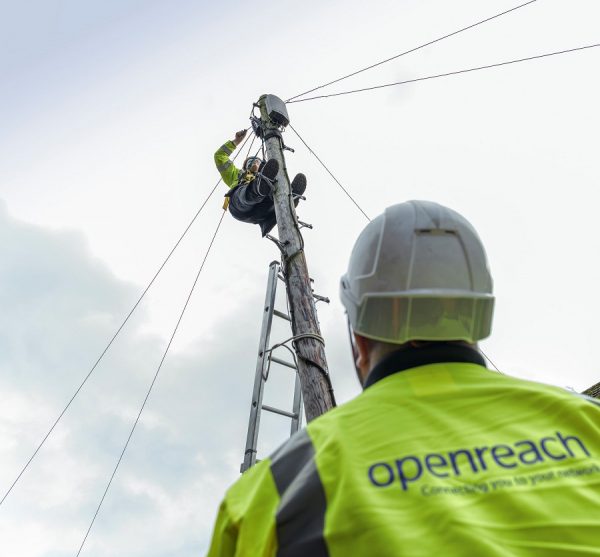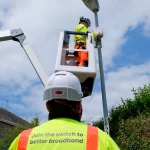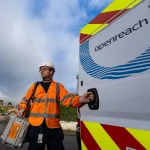Openreach Grow FTTP in Northern Ireland to 260K Premises

Openreach’s (BT) commercial roll-out of a new 1Gbps capable Fibre-to-the-Premises (FTTP) broadband ISP network in Northern Ireland has grown its reach to more than 260,000 premises, which has helped the region to push overall “full fibre” coverage to over 35% (here) and they claim that 40% will be achieved by March 2020.
Admittedly Northern Ireland remains a bit of an oddity since they have weaker coverage of fixed “superfast broadband” 24Mbps+ networks (90%) than any other devolved region within the United Kingdom, but on the flip side gigabit-capable “full fibre” networks are available to around 35% of premises – more than all of the UK’s other devolved regions (the UK average is 11%).
The vast majority of that FTTP has only appeared in the past couple of years and it’s largely thanks to Openreach’s (BT) commercial programme. This year alone some 187,000 premises have been included in the region-wide build programme and 120,000 premises come from the Belfast area, where more than 60% of homes and businesses can now take an FTTP service.
Advertisement
Mairead Meyer, Openreach’s Regional Director, said:
“We’re delighted to have reached this important milestone, enabling even more homes and businesses right across NI to take advantage of improved broadband speeds.
We’re building a network that delivers more than just speed. Full fibre broadband will provide Northern Ireland with a future-proof and consistent service that will help renew towns and communities across the region and supports its position as a leading digital economy.”
We should add that cable operator Virgin Media has also added a bit of FTTP (sadly they haven’t said exactly how much) and new alternative network providers, such as Fibrus, have got big on-going build plans of their own (here). Exactly how much FTTP overbuild there is between these three players is unclear but they all tend to focus most of their efforts on similar urban areas.
Going forward it’s anticipated that the long-in-gestation £165m Project Stratum scheme, which aspires to tackle most of the 97,000 premises that are currently eligible to be upgraded with a “superfast broadband” (30Mbps+) network (here), could help to further extend the reach of FTTP.
Mark is a professional technology writer, IT consultant and computer engineer from Dorset (England), he also founded ISPreview in 1999 and enjoys analysing the latest telecoms and broadband developments. Find me on X (Twitter), Mastodon, Facebook, BlueSky, Threads.net and Linkedin.
« Problems Remain – CMA Updates on Ofcom Loyalty Penalty Fixes






















































It suggests BT has overbuilt 70% of its commercial FTTC cabinets, while taking the same amount of time to conduct the build.
The road to Damascus conversion is nearly complete. This must mean cabinets will not be expanded where FTTP is available? Any idea what proportion of the engineers have been re-trained?
Have to give credit to open reach the role out here is coming along pretty well. Still a lot of out of town work to be done though.
@Mark have you heard any updates on Project Stratum? Was some worrying talk last week about the funding for it now being on question as it was mostly coming from the now void confidence and supply agreement?
@Matthew, it appears that the money is still there and allocated to the project. There were concerns about the funds being shifted to urban projects as opposed to the intended Rural areas but we will have to wait and see I suppose!
Apparently, Project Stratum is in procurement phase but I am sure that must be very nearly at an end. Don’t forget the USO will also be taking requests from March of this year so make sure you get your request in when it opens.
It is all good news for SME’s and home users alike.
One less problem if you want to start a business so it will boost the economy.
https://labs.thinkbroadband.com/local/northern-ireland
Overall at 37.92%, openreach at 33%
As usual, they are just upgrading the profitable areas that already had superfast speeds. Meanwhile Fermanagh and South Tyrone(rural area) are still ranked 650 out of 650 in Andrews Superfast ranking table for at least 2 years now. The council and government have done nothing, and have no plans to improve it. Roll on the USO in March 2020.
The Local Councils (across all parties) fought for Stratum funding beginning in 2015-16, with the request ending in the election agreement. 2 years to confirm the funding and another 2 years on a procurement process.
The B-USO may not help as to begin triggering the industry/Ofcom consultations on who pays for what, BT will need to first make a funding application.
All you can do is to keeping seeking updates from officials on the outstanding procurement.